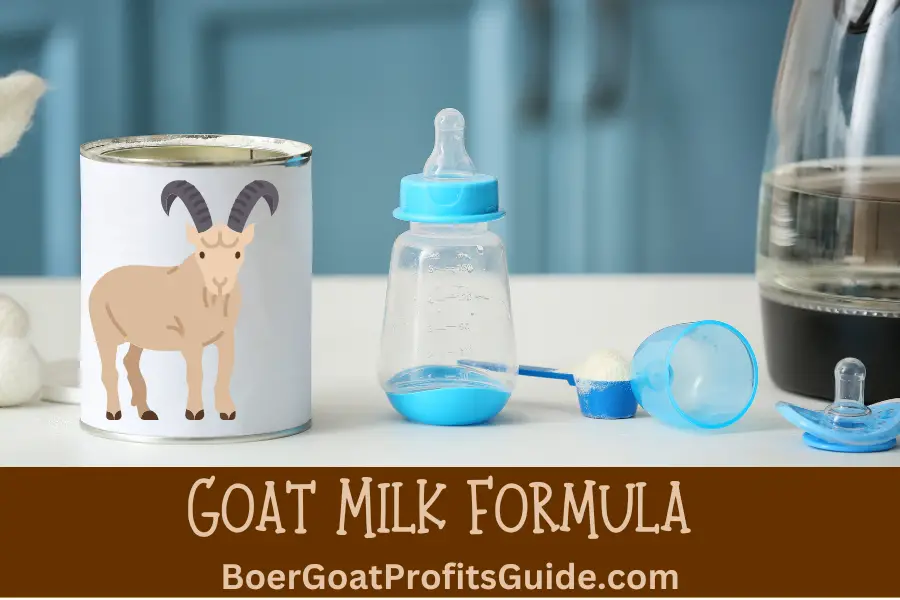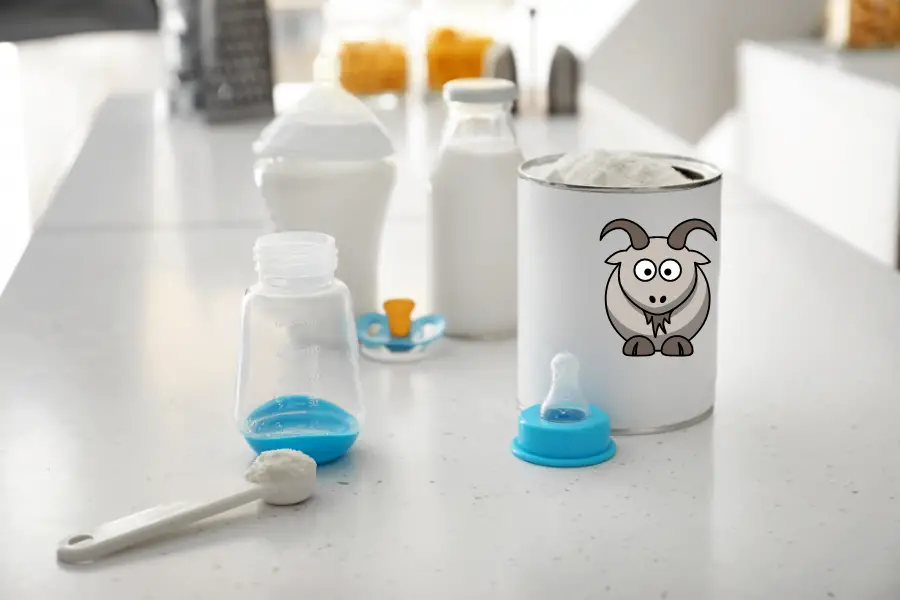
Goat milk formula has been gaining popularity as an alternative to cow’s milk formula for infants. Made from goat’s milk, this type of infant formula is designed to meet the nutritional needs of babies who are either exclusively formula-fed or require supplemental feeding in addition to breastfeeding. Parents may consider goat milk formula for a variety of reasons, including allergies or sensitivities to cow’s milk, better digestibility, or simply personal preference.
Table of contents
Researching Goats Milk Formula
Understandably, parents may have questions about the safety, benefits, and potential concerns of using goat milk formula. It is essential to conduct thorough research, consult with healthcare professionals, and choose the right formula for your baby’s specific needs. This article aims to provide an overview of goat milk formula, including its benefits, drawbacks, and how to choose and prepare it safely.
Key Takeaways
- Goat milk formula is an alternative to cow’s milk formula for meeting the nutritional needs of infants.
- It offers potential benefits such as better digestibility and suitability for some sensitive infants.
- When considering goat milk formula, research and consultation with healthcare professionals are crucial for making a safe and informed decision.
Goat Milk Formula Basics
Goat milk formula is made from goat milk, which is a popular alternative to cow milk based formulas for infants and young children. Goat milk is often considered to be a more easily digestible option and thus more suitable for those with sensitive stomachs.
Nutritional Content
Goat milk formula contains essential nutrients crucial for healthy growth and development of infants. Some of the primary differences between cow and goat milk are in the nutritional content. Goat milk generally contains:
- Calcium: 13% more than cow’s milk
- Vitamin B-6: 25% more than cow’s milk
- Vitamin A: 47% more than cow’s milk
- Potassium: 134% more than cow’s milk
- Niacin: 3 times more than cow’s milk
- Copper: 4 times higher than cow’s milk
In addition to these differences, the protein in goat milk is perceived to be easier to digest compared to cow’s milk protein. This is due to the smaller size of the fat globules in goat milk, which can potentially aid in digestion.
Common Uses
Goat milk formula is commonly used in the following scenarios:
- Infants with cow’s milk protein sensitivity: For infants who cannot tolerate cow’s milk due to sensitivity or allergy, goat milk formula is a suitable alternative as it is gentler on the digestive system.
- Easier digestion: Parents may choose goat milk formula if their child experiences digestive discomfort with cow’s milk-based formulas.
- Organic or whole cream preference: Formulas like Holle Goat Organic Milk Formula Stage 1 and Aussie Bubs Goat Milk Formula are made with organic or grass fed A2 Goat Milk, which some parents may prefer.
Keep in mind that it is essential to consult with a healthcare professional before switching your infant to a goat milk formula to ensure it meets their specific nutritional needs.
Benefits of Goat Milk Formula

Goat milk formula offers a range of benefits to infants, particularly when it comes to digestion and reducing allergens. In this section, we will focus on these two aspects.
Easier Digestion
Goat milk formula is known for its easy digestibility. It has a different protein structure and fat globules that are smaller than those in cow’s milk formula, making it simpler for babies to break down and absorb. This can lead to fewer gastrointestinal issues such as gas, bloating, and constipation, providing a smoother feeding experience for both babies and their caretakers.
Moreover, goat milk has a higher concentration of medium-chain fatty acids compared to cow’s milk, which are more efficiently absorbed and utilized by the body, contributing to better digestion and nutrient absorption.
Reduced Allergens
For infants who are sensitive to cow’s milk proteins, goat milk formula can be a great alternative. Allergies to cow’s milk are common in babies, but many of those who react poorly to cow’s milk can tolerate goat milk well. This is likely due to differences in the protein composition of the two types of milk.
In particular, goat milk contains less of the allergenic protein called alpha-S1 casein, which is found in higher concentrations in cow’s milk. As a result, the risk of an allergic reaction may be lower with goat milk formula.
In conclusion, goat milk formula can be a suitable choice for parents seeking a more digestible and allergen-friendly option for their babies.
Choosing the Right Goat Milk Formula
When selecting the right goat milk formula for your baby, it’s important to consider factors such as organic ingredients, types of formula, and the specific needs of your child. In this section, we’ll explore some of these factors and provide recommendations for choosing the best offering.
Organic Options
For parents who prioritize organic ingredients, there are several goat milk formula options available. Holle Goat Organic Milk Formula Stage 1 is a popular choice as it is made from 100% organic goat milk. Other organic options include HiPP Dutch Goat and Kendamil Goat and NannyCare. These formulas ensure that the ingredients used come from farms with sustainable and environmentally-friendly farming practices.
Types of Formula
There are various types of goat milk formula available for different age groups and specific dietary requirements. Our recommendations for these categories are as follows:
- Best Goat Milk Infant Formula: Aussie Bubs Goat Milk Formula is specially designed for infants up to 12 months old and provides the right balance of nutrients required for their growth and development.
- Best Toddler Goat Formula: Kabrita USA caters to toddlers from 1 to 3 years old, providing a nutrient-rich formula to support their growth and development needs.
- Best Goat Milk Formula Using Whole Milk: Kendamil Goat and NannyCare utilizes whole goat milk instead of skimmed milk powder, which can offer additional benefits for your baby.
- Best European Goat Milk Formula: HiPP Dutch Goat is a premiere European option, adhering to strict European regulations for baby formula production.
- Best Goat Formula with Prebiotics: Kabrita Infant Formula contains a prebiotic blend of GOS and FOS, which help promote healthy gut flora.
- Best Affordable Goat Milk Infant Formula: Holle Goat Milk Formula offers a budget-friendly option while maintaining high quality organic ingredients.
When choosing the right goat milk formula for your child, consider their age, specific dietary needs, and preferences, as well as your own values, such as using organic or environmentally-friendly products.
Preparing and Storing Goat Milk Formula
Mixing Instructions
To prepare goat milk formula, follow the instructions on the label. In general, you need to:
- Wash hands: Always start with clean hands to ensure proper hygiene.
- Use a clean, sterilized bottle.
- Heat cold water until it reaches the recommended temperature. Use a thermometer.
- Add the appropriate amount of formula powder.
- Shake well: Mix by shaking the bottle until everything is dissolved.
Proper Storage
Proper storage of the prepared goat milk formula is crucial to maintain freshness and ensure its safety for your baby. Follow these storage guidelines to keep the formula fresh and safe:
- Freshly mixed formula: Once prepared, the formula should be used immediately or be refrigerated immediately. If not consumed right away, the formula can be stored in the refrigerator for up to 24 hours.
- Unused formula: If your baby doesn’t finish the entire bottle, discard the remaining formula within 2 hours of the start of feeding. Bacteria can multiply quickly in a warm environment, especially if it has been exposed to saliva from your baby’s mouth.
- Powdered ingredients: Store unopened powdered goat milk ingredients in a cool, dry place. Once opened, keep them in an airtight container and use them within the specified time frame mentioned on the packaging.
By following these mixing instructions and proper storage guidelines, you can provide your baby with a healthy, safe, and easily digestible alternative to traditional infant formulas.
Don’t Make Your Own Goat Milk Baby Formula
The United States Food and Drug Administration has regulations specifically for infant formula. Other countries have similar regulations.
We do not recommend that you make your own formula. Use only FDA-approved products. Giving straight goat milk to an infant can cause serious anemia and malnutrition.
Goat Milk Formula Video – Official Aussie Bubs Video
In this short and informative official video from Aussie Bubs, see the Australian Goat farm where the Aussie Bubs goats live.
Frequently Asked Questions
Goat milk formula is an adequate source of many essential vitamins, minerals, and short- and medium-chain fatty acids. Use only FDA approved products.
Aussie Bubs Goat Milk Formula is considered a good product for healthy development. It is made with whole A2 goat milk with grass fed goats, and it contains prebiotics. Goat milk protein is also easier to digest than cow’s milk protein.
Goat milk protein is generally easier to digest than cow’s milk protein due to the smaller size of fat globules and a more accessible protein structure. Goat milk is also lower in lactose, which may benefit those with lactose sensitivity.
A2 formula refers to milk containing only the A2 beta-casein protein, which is considered easier to digest. A2 goat milk formula is a good option for infants because it contains this protein type and shares many of the same health benefits as regular goat milk formula.
Though goat milk protein is easier to digest than cow’s milk, it is possible that some infants may still have allergies to goat milk proteins. If you suspect your child has an allergy, consult with a healthcare professional before using goat milk formula.




